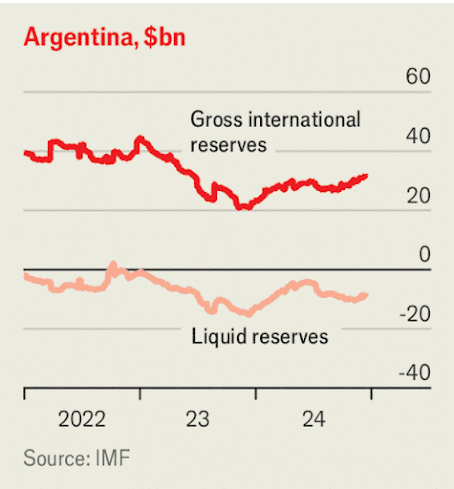Chainsaw reaction
Why the IMF should bail out a serial deadbeat
Under President Javier Milei, Argentina has changed
By the end of the month, according to Kristalina Georgieva, the imf’s managing director, Argentina will have been bailed out for the 23rd time.
No other country has borrowed as often and as much; nor has any been so difficult a customer.
For decades Argentine leaders have promised sensible reforms in return for help to stave off default, only to renege when the money was handed over and continue with their spendthrift, market-distorting habits.
But Javier Milei, Argentina’s current president, seems to represent a rare break with the past.
Since he took office in December 2023, he has been energetically cutting costs and slashing regulations.
If the fund wants to wean the country off serial bail-outs, it should be generous now.
In recent years Argentina’s reliance on the imf has taken on mind-boggling proportions.
In 2018 the fund approved a mammoth $57bn rescue loan for Mr Milei’s predecessors.
They failed to rein in spending, and soon Argentina had no foreign reserves except for what it had been lent by the fund.
By 2022 the only way the country could meet its repayments was via another $40bn loan from the fund, which in effect paid down the previous loan.
Argentina now owes the IMF 15% of its external debt, making the fund its biggest single creditor.
This dependence is a problem for the imf as well as for Argentina.
Because the fund typically extends emergency bail-outs, not long-term support, creditors usually accept that the fund should be first in line to get its cash back.
But why should they when the imf has become a fixture in Argentina?
Other borrowers, meanwhile, can hardly be expected to take the imf’s demands for reforms seriously when Argentina has blithely ignored them without suffering any consequences.
The fund faces financial risks as well as reputational ones.
Lending to Argentina represents 28% of its loan book, enough to threaten the imf’s solvency if Argentina defaults.
At the very least, the fund would lose its stellar credit rating, which allows it to borrow cheaply.
Now Argentina’s financial stability is once again on a knife-edge.
Since coming into office Mr Milei has devalued the peso, but inflation has not fallen quickly enough, leaving the peso overvalued again.
Excluding gold and swap lines from other countries, Argentina’s foreign reserves are still in the red.
A few months of big import bills, or a loss of confidence by foreign investors, could tip the country into a balance-of-payments crisis.
Past experience would suggest that another bail-out would be throwing good money after bad.
But things are different today.
Mr Milei is Argentina’s best economic reformer in decades.
During the latest programme’s final year he managed to produce a fiscal surplus, pulling off more than twice the consolidation sought by the fund.
That was despite the fact that disbursements were front-loaded, meaning that he had less of a financial incentive to impress the fund.
The imf is used to dealing with politicians who make half-hearted promises.
But Mr Milei has smoothed the way by signing an executive order bypassing the need for a programme to be approved by Congress, which could have delayed a bail-out for months.
In doing so, the president has also taken personal responsibility for implementing the IMF’s conditions, a promising sign.
Few of his predecessors have had the stomach for the pain that economic adjustment requires.
Now Mr Milei says he wants to deal with his peso problem permanently, by removing capital controls and eventually letting the peso float.
That would boost exports and ease pressure on reserves, both of which Argentina needs if it is to grow.
But Mr Milei worries that going ahead without a large cushion of dollars risks capital flight, triggering a currency crisis and a spike in inflation before mid-term elections in November.
To reassure him, the IMF should offer a generous amount of money, and soon.
At the same time it should insist on a more realistic value of the peso, ensure the timeline to remove capital controls does not slip and push for a brisk move to a fully floating exchange rate.
The new Argentina needs help to keep reforming.
It is in the IMF’s best interest to back it.


0 comments:
Publicar un comentario